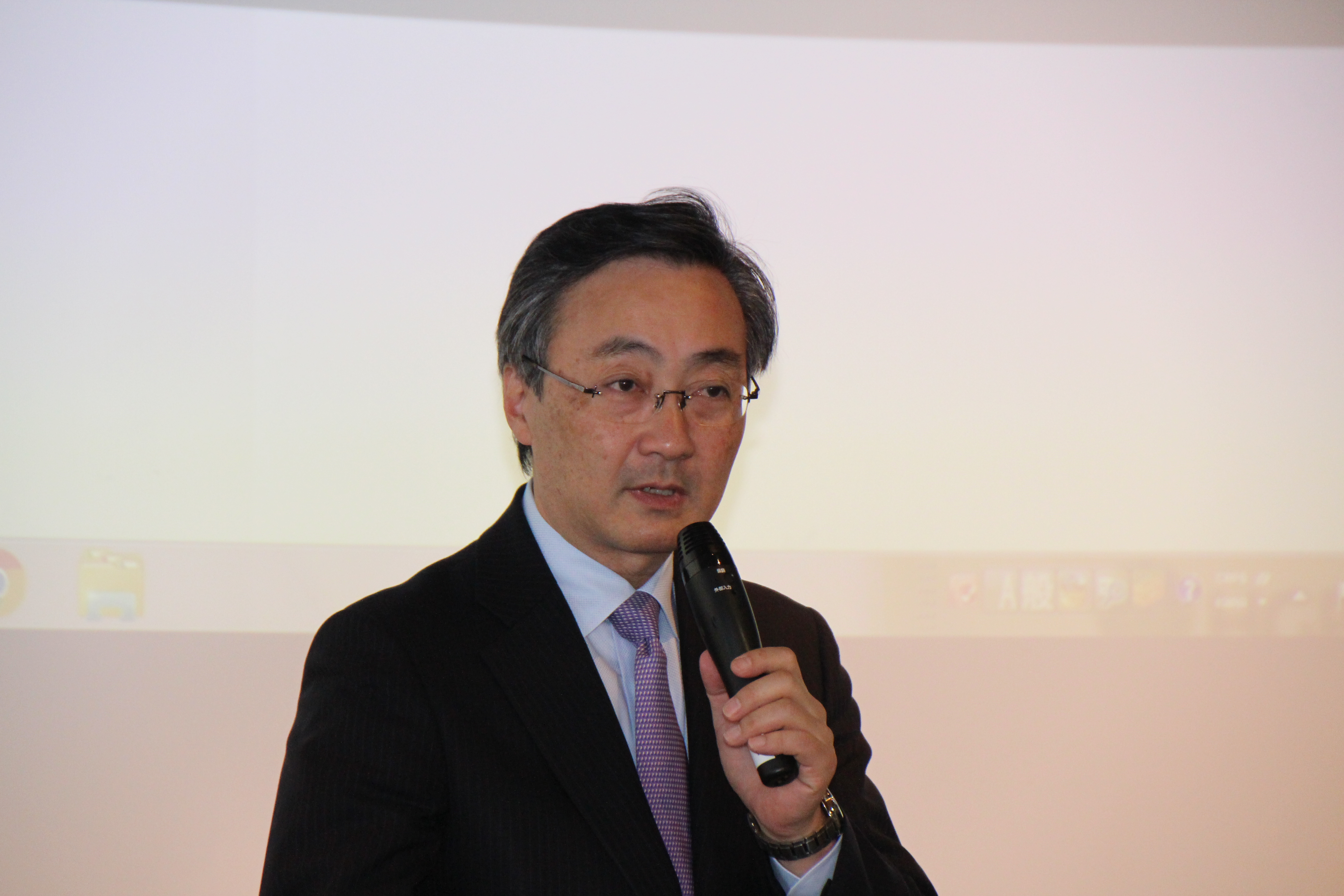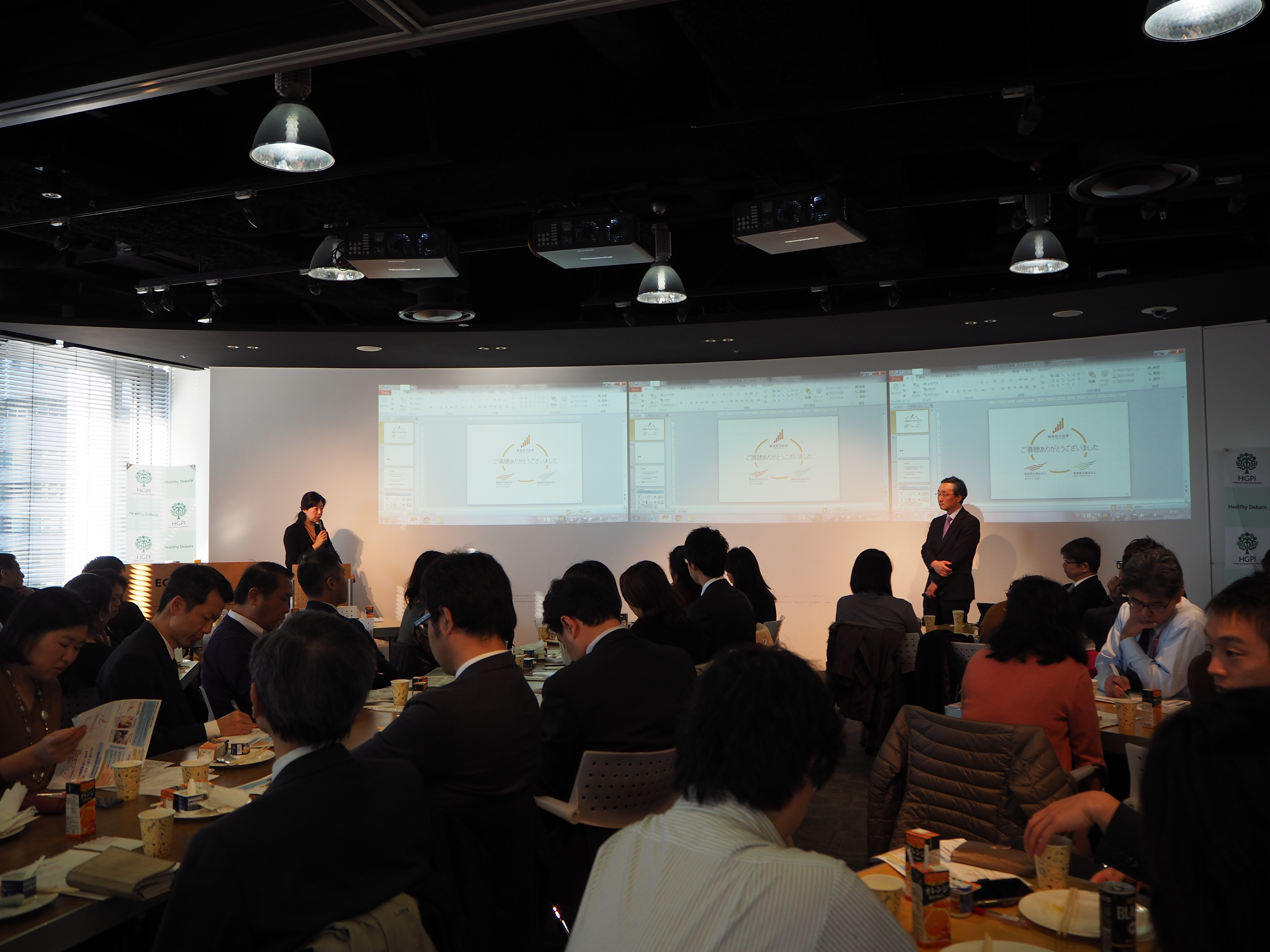[Event Report] The 65th Breakfast Meeting: Healthcare in the workplace – Health and productivity management initiatives – (November 27, 2017)
date : 1/5/2018
Tags: Future of the Health Care System, HGPI Seminar, Innovation and Sustainability
![[Event Report] The 65th Breakfast Meeting: Healthcare in the workplace – Health and productivity management initiatives – (November 27, 2017)](https://hgpi.org/en/wp-content/uploads/sites/2/b76139eaf32ef90ae86a7e83e6df4520-1.jpg)
HGPI invited Ms. Sayaka Tomihara from the healthcare industries division of the commerce and service industry policy group of the Ministry of Economy, Trade and Industry (METI) to the 65th breakfast meeting. Ms. Tomihara introduced the initiatives his ministry is launching under the banner of health and productivity (these include the Health and Productivity Stock Selection; commendation systems such as the White 500; Health and Productivity Advisors; preferential treatment by municipalities and regional credit union banks, and so on). She also discussed the effects of these initiatives on society and enterprises, current challenges, and the outlook for the future.
The event was moderated by HGPI board member Ken Shibusawa. Mr. Shibusawa is also a member of the Government’s health and productivity survey exploratory committee, and the Government committee for selecting companies eligible for a Nadeshiko certification, which recognizes companies that promote women.
Mr. Shibusawa opened by stating that initiatives by companies to maintain their employees in good health are important, although they cost money. He continued by saying that spending money on health and productivity should be seen as a long-term investment instead of a cost incurred. He explained that without healthy employees and managers, companies cannot sustain the creation of value. Society can only achieve economic prosperity if value creation is maximized through investments in human capital. He expressed the hope that the audience would be convinced of that perspective through his talk.

■Lecture summary
In a super-aged society, spiraling social security costs will place a large strain on public finances. Together with the decrease in the workforce, this will raise the risk of economic stagnation. In 2017, the ratio of elderly people (age 65 or older) to working people was 1 to 2 (i.e. every two working people were de facto providing support to one elderly person through the social security system). If the current state of affairs continues, by 2050 this ratio will rise to 1 to 1.3. However, if people aged 65 or more maintain some level of self-reliance, by 2050 a ratio of 1 to 2.3 could be achieved. To that end, METI is working to create a “lifelong active society.” The Government’s health and productivity measures encourage companies to put into practice a strategy of health management to maintain and promote the health of employees, out of the expectation that investments in human capital will generate profits in the future. Following this logic, companies should launch concrete initiatives to maintain and improve the health of their employees, leading to increases in employee productivity, vitality, and bodily health, which in turn will energize the entire company. In the past, METI promoted regenerative and personalized medicine, as well as the development of technology for advanced medical applications. However, METI realizes that what is needed now for society is to nurture a culture of sound health. In order to make the concept of health and productivity a reality, three years ago, METI began certifying certain stocks as “Health Stocks” on the Tokyo Stock Exchange. This initiative, publicized by most media outlets, also helped students better select companies in which they would want to work, which also raised the importance of becoming a “White company” (In Japan, companies with stressful and unhealthy work cultures are often colloquially called “Black companies”). Thanks to this initiative, the task of maintaining the health of employees, which in the past was the sole prerogative of the department of occupational health in each company, has now come to involve the whole company, not just managers. That is a huge achievement.
On another note, it important to emphasize that the concept of health and productivity is of particular consequence to small- and medium-sized companies. On this topic, METI has cooperated with a number of organizations to evaluate health-related initiatives in small- to medium-sized firms by launching, in February 2017, the Certified Health and Productivity Management Organization Recognition Program (White 500), which recognizes companies that are making strides to improve the health of their employees. What’s more, METI is currently researching and developing ways to estimate the return on investment of such health initiatives, and undertaking follow-up surveys on yearly healthcare costs and the rates of overweight employees. The results reveal that the number of companies which scored high on health initiatives is lower than that of those which scored low.
The number of municipalities, regional banks and other institutions that provide incentives to initiatives by companies to improve their employees’ health is increasing. Such incentives include public recognition by municipalities and low-interest rate loans by regional banks, credit unions and private sector enterprises. METI will work to further expand such schemes. At METI, we want companies which engage in health promotion for their employees to both make more profit and expand their workforce. One of the many challenges moving forward is how to get small- to medium-sized companies to join in implementing such initiatives. In the field of health management, the main focus at many companies is to maintain a healthy weight for their employees. However, health risks differ depending on the type of job. In the future, METI wants to collaborate with the Ministry of Health, Labour and Welfare (MHLW) on launching targeted initiatives to resolve specific challenges associated with particular ways of working. Among these initiatives, those that answer to women’s needs are most important.
In Japan, it is possible to collect high quality data under the system of national universal healthcare. It is also possible to offer incentives based on the system for the reimbursement of medical fees. Efforts are being made now to aggregate data and create businesses to support high-value medical services. Eight teams are currently working on this task. The use of the Internet of Things (IoT) is enabling the business world and community healthcare organizations to collaborate, and encouraging cooperation between workplace doctors and clinicians. For three years, together with the Japanese Diabetes Society, METI has been implementing a project to prevent the aggravation of symptoms for people living with diabetes. It is now understood that thanks to personalized healthcare guidance, the number of diabetes patients who showed a decrease in the value of Hemoglobin A1c was very large.
METI is considering the implementation of a new system of healthcare and nursing care by 2025. Among other things, the new system will make the use of robots, sensors, and Artificial Intelligence (AI) in nursing care to reduce workload a main priority. By using these social support tools effectively, METI hopes to spark a revolution in social systems, and to give elderly people the necessary impetus to lead active lives.

■Discussion
The lecture was followed by a lively exchange of opinions between Ms. Tomihara and the audience.
During the Q&A session, Ms. Tomihara expressed the opinion that the system of public commendations for good health initiatives is of mere secondary importance. What is important is that, once every year, all concerned stakeholders self-evaluate their health and productivity improving initiatives. She declared that she would like the whole of society to be aware of the importance of health management.
■About Ms. Sayaka Tomihara
(Ministry of Economy, Trade and Industry Commerce and Service Industry Policy Group Healthcare Industries Division Deputy Director)
After graduating from Tokyo University, Graduate School of Pharmaceutical Sciences, she started her career at the Ministry of Economy, Trade and Industry, Government of Japan in 2006. At METI, she has mainly been in charge of industrial workforce, industrial revitalization, energy conservation, renewable energy and international trade policy before taking on her current role as Principal Deputy Director of Healthcare Industry Division.
Kellogg School of Management MBA.
Top Research & Recommendations Posts
- [Policy Recommendations] The Path to a Sustainable Healthcare System: Three Key Objectives for Public Deliberation (January 22, 2026)
- [Research Report] The 2025 Public Opinion Survey on Healthcare in Japan (March 17, 2025)
- [Research Report] Perceptions, Knowledge, Actions and Perspectives of Healthcare Organizations in Japan in Relation to Climate Change and Health: A Cross-Sectional Study (November 13, 2025)
- [Policy Recommendations] Reshaping Japan’s Immunization Policy for Life Course Coverage and Vaccine Equity: Challenges and Prospects for an Era of Prevention and Health Promotion (April 25, 2025)
- [Research Report] AMR Policy Update #4: Cancer Care and AMR (Part 1)
- [Research Report] The 2023 Public Opinion Survey on Satisfaction in Healthcare in Japan and Healthcare Applications of Generative AI (January 11, 2024)
- [Public Comment Submission] “Assessment Report on Climate Change Impacts in Japan (Draft Overview)” (December 24, 2025)
- [Research Report] The 2026 Public Opinion Survey on Healthcare in Japan (February 13, 2026)
- [Policy Recommendations] Developing a National Health and Climate Strategy for Japan (June 26, 2024)
- [Research Report] The Public Opinion Survey on Child-Rearing in Modern Japan (Final Report) (March 4, 2022)
Featured Posts
-
2026-01-09
[Registration Open] (Hybrid Format) Dementia Project FY2025 Initiative Concluding Symposium “The Future of Dementia Policy Surrounding Families and Others Who Care for People with Dementia” (March 9, 2026)
![[Registration Open] (Hybrid Format) Dementia Project FY2025 Initiative Concluding Symposium “The Future of Dementia Policy Surrounding Families and Others Who Care for People with Dementia” (March 9, 2026)](https://hgpi.org/en/wp-content/uploads/sites/2/dementia-20260309-top.png)
-
2026-02-05
[Registration Open] (Webinar) The 141st HGPI Seminar “Current Status and Future Prospects of Korea’s Obesity Policy: Voices of People with Lived Experience in Policy Promotion” (March 3, 2026)
![[Registration Open] (Webinar) The 141st HGPI Seminar “Current Status and Future Prospects of Korea’s Obesity Policy: Voices of People with Lived Experience in Policy Promotion” (March 3, 2026)](https://hgpi.org/en/wp-content/uploads/sites/2/hs141-top-1.png)




